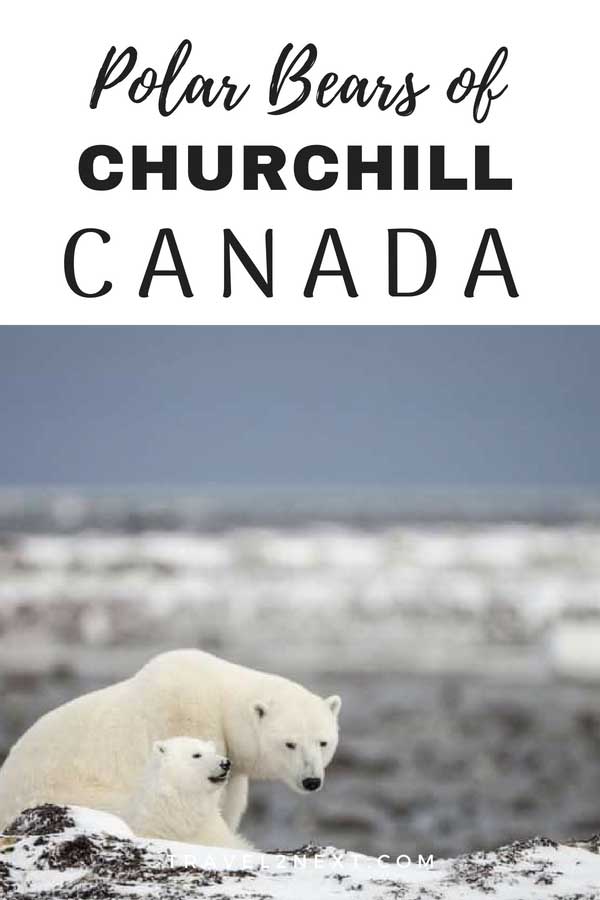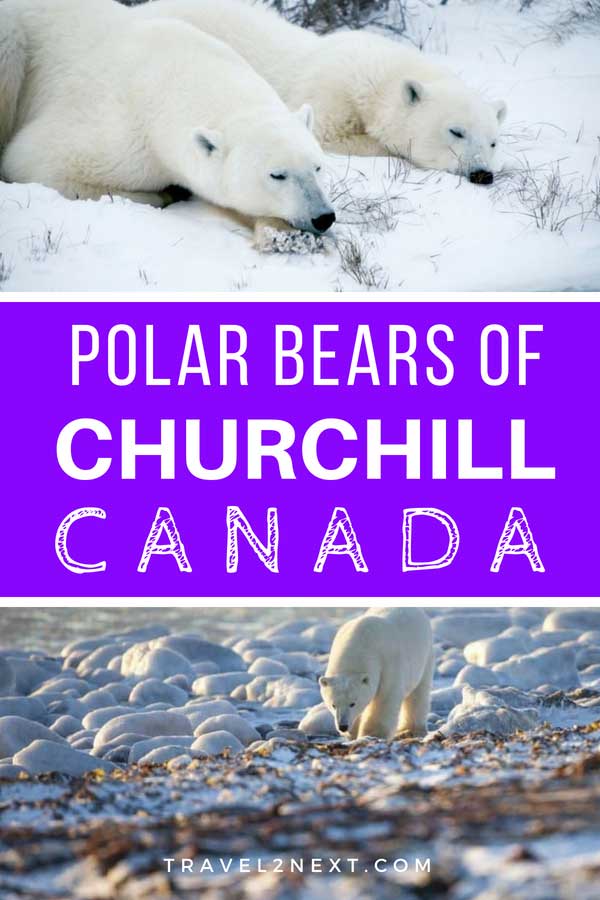If you happen to know someone who has seen polar bears in the wild, chances are they’re most likely to have seen them in Churchill. The Canadian polar bear town in Manitoba calls itself the Polar Bear Capital of the World – deservedly so. Seeing the Churchill polar bears is a bucket list experience.
The best season for polar bear viewing is in Autumn when about 1000 polar bears turn up between July and November each year to substantiate Churchill’s claim to the moniker.
The Churchill polar bears roam on the beach and sleep on the rocks.
Sometimes they boldly stroll right into the town’s main street.
There’s little doubt Churchill is a polar bear town and a visit to Churchill is right up there as one of the top things to do in Canada.
There’s even a post office where you can get your passport stamped to prove you have visited the Polar Bear Capital of the World.
Contents
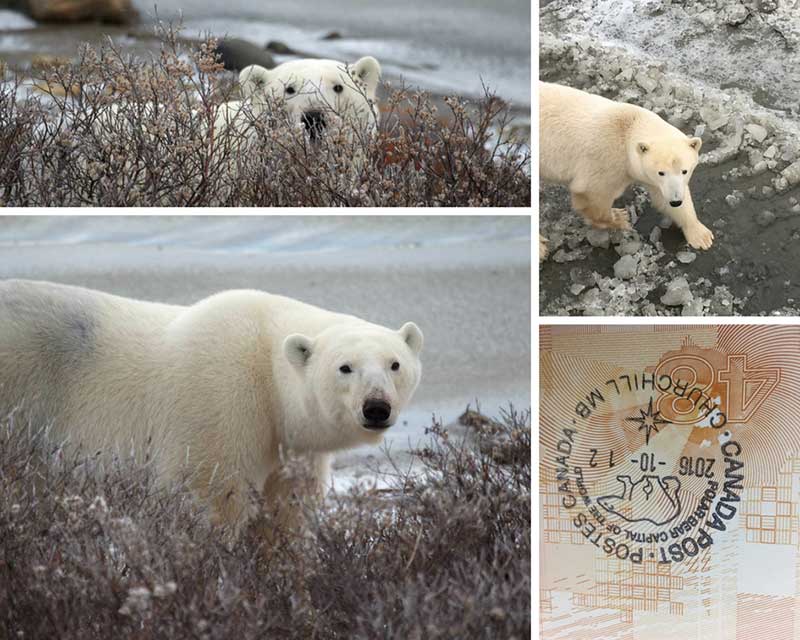
Churchill
My polar bear dream
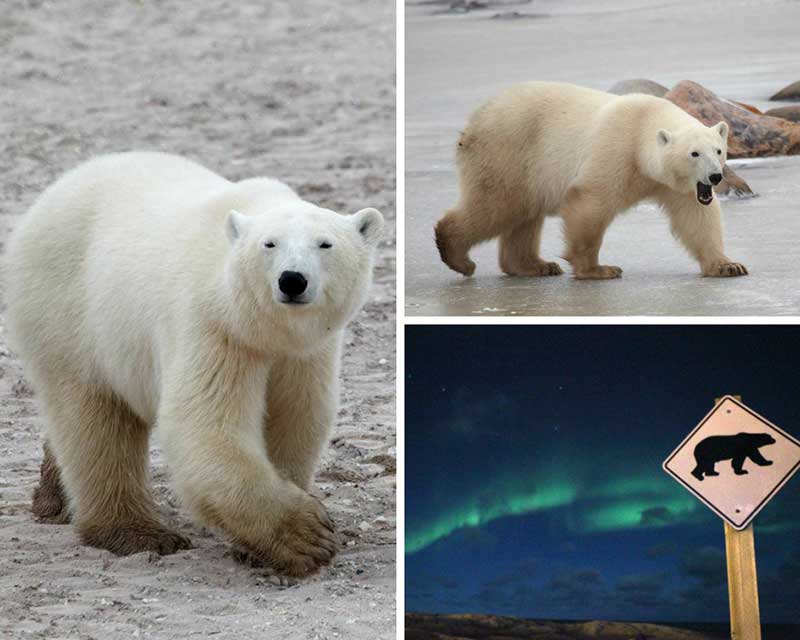
One of the main reasons I’m keen to see polar bears in the wild is because, a few years ago, I had a bizarre dream.
In my action-packed dream world, I’m an intergalactic law enforcement officer hot in pursuit of two villains from another planet.
The villains crash their spacecraft on the ice in the Arctic and flee on foot across the vast white tundra.
I catch up with them on a frozen bay and zap them with a quantum laser. The bad guys magically transform into fully grown adult polar bears, with big teeth and sharp claws.
The climax of my dream is the desperation on the faces of the villains when they realise they are trapped in the bodies of polar bears and sentenced to life in an icy Arctic prison.
I can still recall the shock and panic they felt upon realising the predicament they were now in.
Visiting Churchill Manitoba
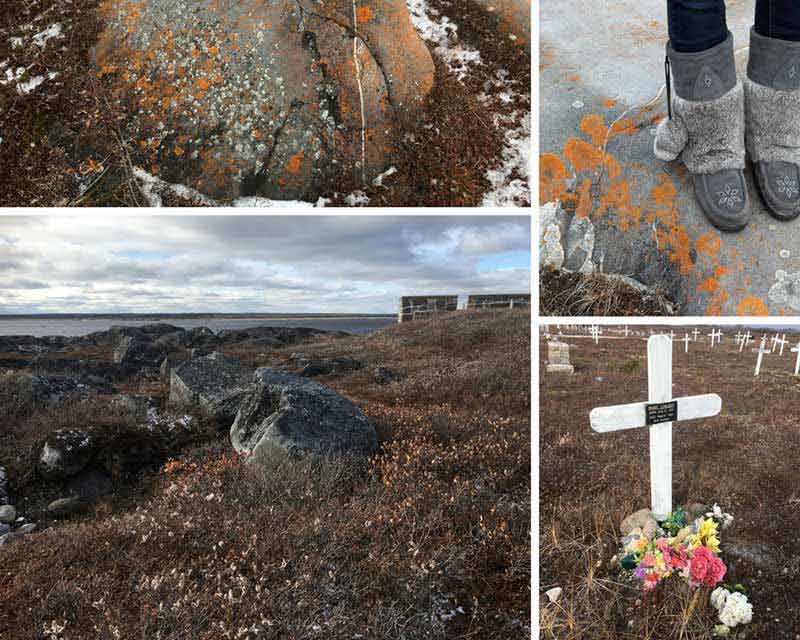
Five years after dreaming of spaceships and polar bears, I finally make it to Churchill.
With the boreal forest to the south and the Arctic tundra to the north-west, Churchill’s location puts it right on the natural migration path of the polar bears.
The landscape around Churchill is a barren picture of earthy hues pockmarked with bushes and boulders of the Precambrian shield.
Churchill has fascinating geology with some of the oldest rocks on the planet.
Grey clouds hang in the sky and the muted colours paint a bleak picture.
Yet, there’s an unearthly beauty in this isolated outpost.
But it doesn’t look anything like the white frozen wilderness that was the setting of my dream.
The main purpose of my trip is to head out onto the tundra to see polar bears from the safety of a tundra buggy.
However, there are a few other tourist attractions around Churchill where polar bears sometimes lurk.
More Canada ideas:
For more about Canada read:
Where To See Polar Bears in Churchill
1- Cape Merry Battery
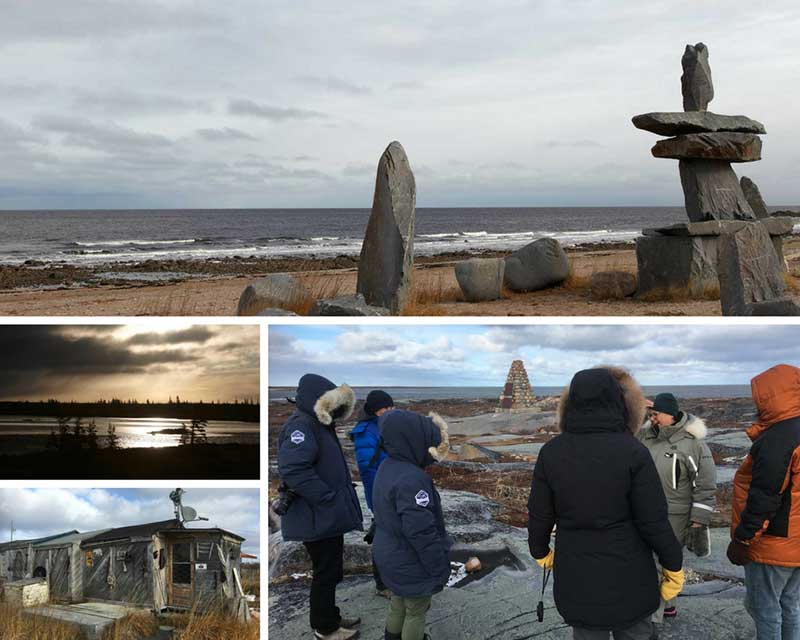
Polar bears have been spotted at Cape Merry Battery, near the gunpowder magazine.
Built in 1746, the magazine was used to guard the fur trading post of the Hudson’s Bay Company.
A crashed Curtis C-46 Commando freight plane called Miss Piggy also has plenty of hiding spots for polar bears.
2- Wandering the streets of Churchill
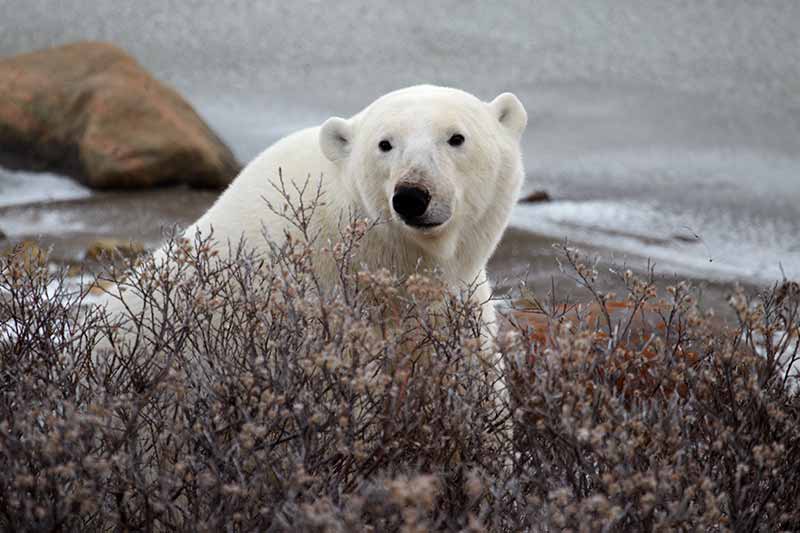
At the right time of the year, you might even see polar bears wandering right into town.
Despite the sirens, flares and rubber bullets used to keep them away, some polar bears continue to visit the town.
3- The polar bear prison
To discourage them from returning, the stubborn ones are locked up with no food for six weeks in a former military aircraft hangar.
That’s why Manitoba Conservation’s holding facility is also known as the polar bear prison.
After the stint in jail, the polar bears are either let out or sedated and dropped off 80km away from town in a net dangling beneath a helicopter.
4- On the beach
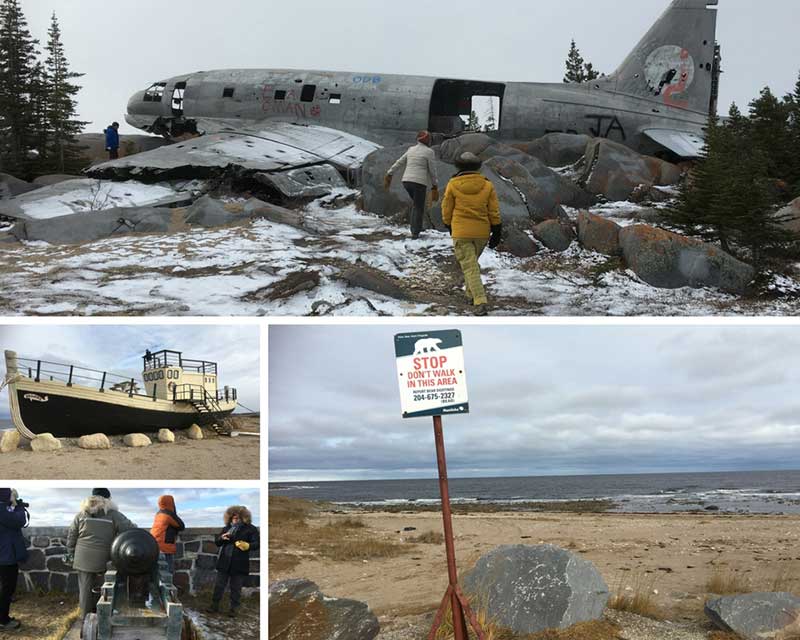
5- Eskimo Museum
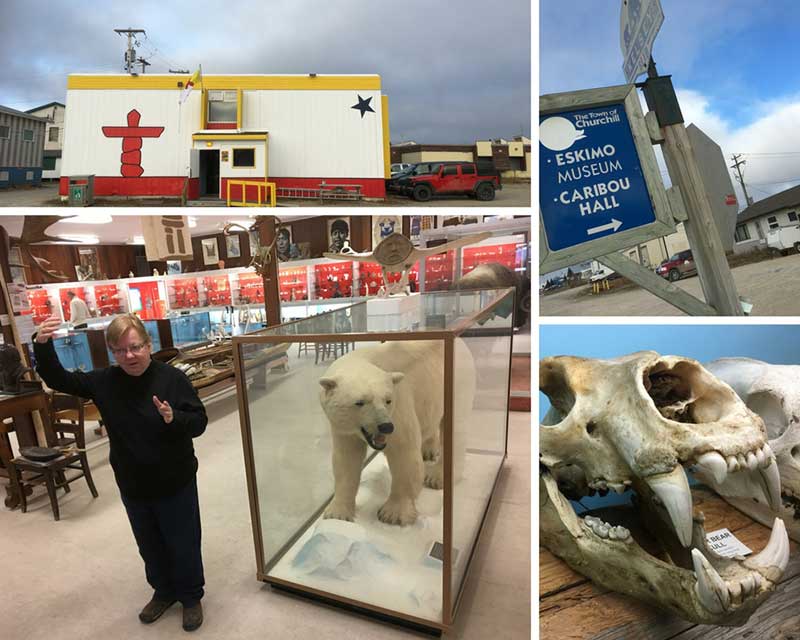
You can learn more about these issues at Churchill’s Parks Canada’s Interpretive Centre and the Eskimo Museum in Churchill.
Polar Bear Facts
How many polar bears are left in the world?
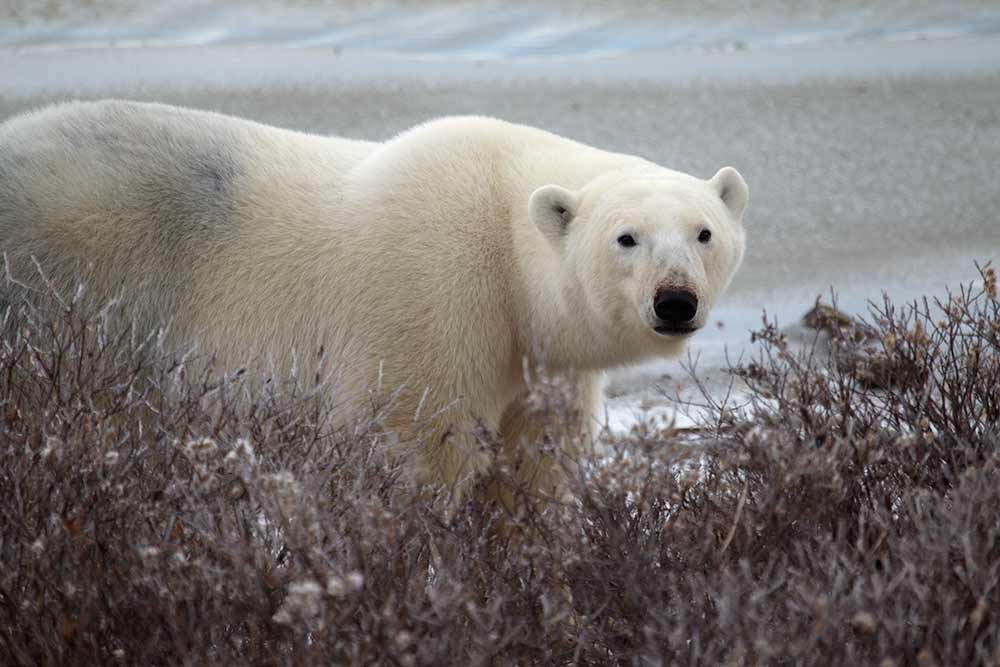
There are around 21,000 to 25,000 polar bears left in the wild, roaming the sea ice of Canada, Alaska, Russia, Greenland and Svalbard. The US Endangered Species Act (May 2008) lists polar bears as a threatened species and the IUCN Red List has polar bears classified as vulnerable.
But is this enough to save the polar bears?
Around two-thirds of polar bears are in Canada and the most accessible place to see them is around Churchill, Manitoba.
What do polar bears eat?
In the Arctic, polar bears thrive on a high-calorie diet of bearded and ringed seals.
However, when food is scarce, they look for other prey such as reindeer and muskox.
They also eat bird’s eggs and berries. Marine mammals like beluga whales and narwhals aren’t safe either.
How do polar bears live?
The planet’s biggest land-based carnivores are strong swimmers and they can swim for hours from one piece of ice to another.
As the sea ice is always changing, polar bears don’t have territories.
They respond to seasonal changes and will hang around where there are plenty of seals.
Polar bears usually live and hunt alone but they will sometimes share their food with other polar bears.
The polar bear etiquette when asking for food is to slink low to the ground and circle the carcass slowly.
The final gesture is to touch the nose of the polar bear in charge.
Are polar bears endangered?
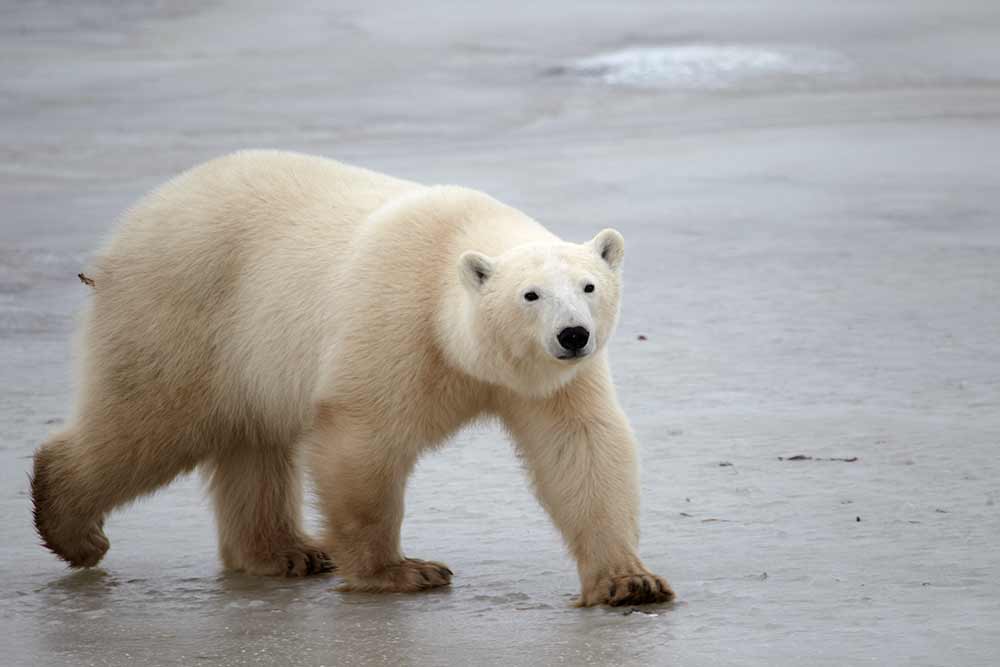
Scientists believe two-thirds of the world’s polar bears could be gone by 2050 and polar bears could become extinct by 2100. This is due to a number of reasons:
1- Climate Change
Climate change is causing the sea ice to melt and shorter polar bear feeding seasons means less food for the polar bears.
Polar bears need sea ice to travel and hunt.
The melting sea ice is forcing the polar bears to spend more time on land, which means increasingly shorter seasons for the bears to feed.
The result is unhealthier bears and fewer cubs.
2- Habitat destruction
Oil spills are destroying their habitat, creating health risks through toxins and reducing the insulation of their fur.
3- Polar bear hunting
Polar bears are culturally significant to the native people of the Arctic, who have hunted polar bears for survival for centuries.
The USA, Canada and Greenland allow controlled subsistence hunting of polar bears.
There’s an annual legal harvest of polar bears of between 700 to 800 animals each year.
4- Conflicts with humans
There’s also the potential for more conflict with humans as polar bears are thrust into more frequent contact with humans while on land.
Polar bear population studies
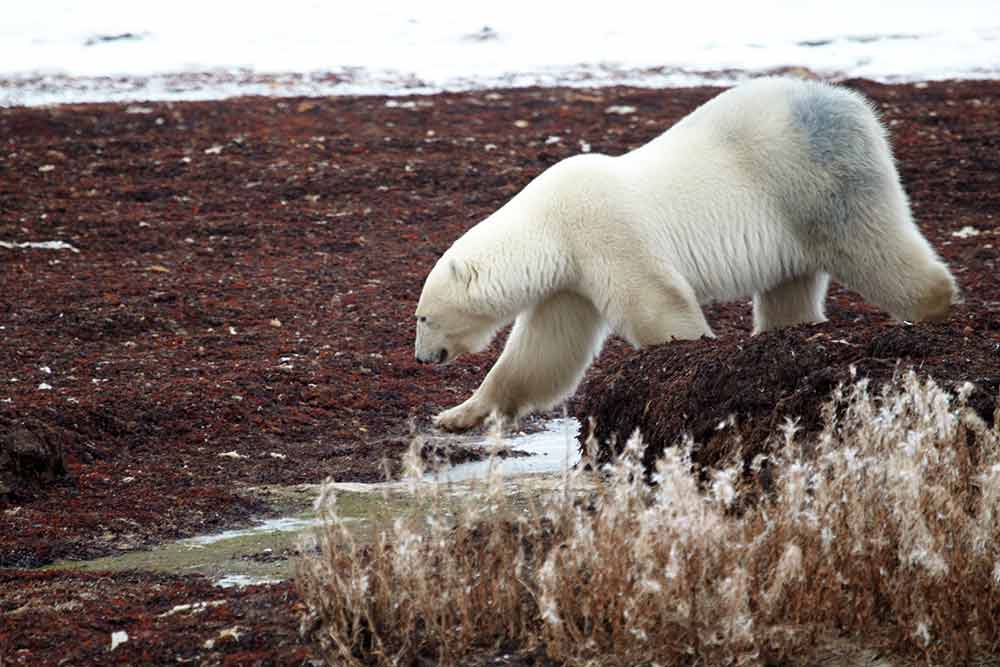
The future is bleak for species that thrive in Arctic conditions and the survival of the polar bear is not looking good.
Polar scientists believe that within the next few decades, the summer sea ice in the Arctic will disappear.
The theory is backed up by several reports, including a NASA-funded study using satellite data.
Results of the NASA study shows a trend that the sea ice is melting earlier in spring and forming later in autumn.
It’s an issue that is affecting all 19 polar bear subpopulations.
As a result of the melting sea ice, polar bears are losing their habitat and food source.
According to a scientific report published in April 2017 by the International Union for Conservation of Nature (IUCN), the situation in the Arctic may be far more urgent than scientists previously believed.
That report says that the Arctic region is warming twice as fast as anywhere else.
The melting sea ice is opening up opportunities for new shipping routes, industrial fishing and oil and gas development.
Scientists fear that these human activities are likely to cause irreparable damage to the already fragile Arctic ecosystems.
To help save the Arctic, the report recommends seven marine sites in the Arctic Ocean that desperately need World Heritage protection.
Churchill Polar Bear Tours
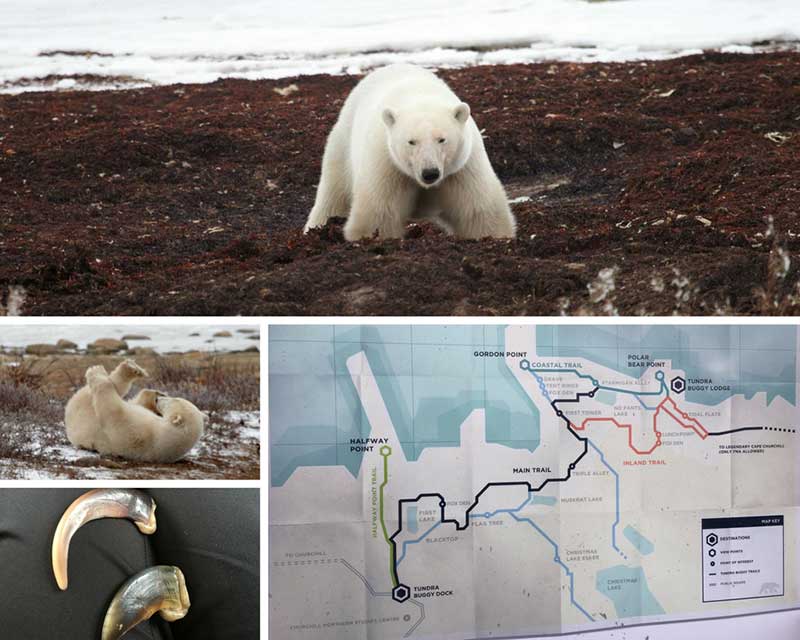
We learn this and other polar bear facts from a Polar Bear International (PBI) volunteer who joins us on board our Frontiers North Tundra Buggy.
In the distance, the tundra looks like the caramel and vanilla layers of an ice cream sandwich.
A polar bear is busily digging the ground with its mouth and claws.
Frontiers North Tundra Buggy tour
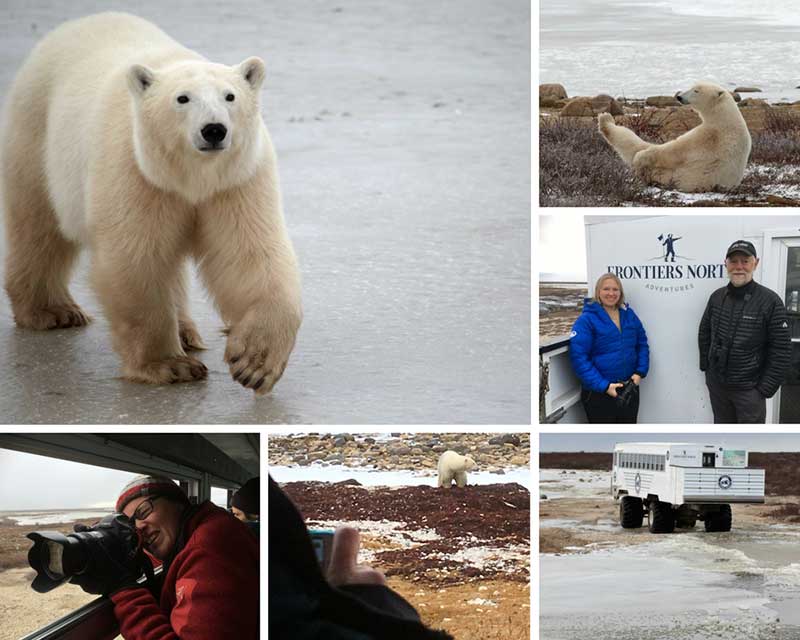
Frontiers North sponsors several of PBI’s conservation projects.
The tour company also provides PBI with a mobile broadcast and research centre aboard a tundra buggy.
Tundra Buggy One is decked out with equipment that enables scientists to study the bears and broadcast live webcasts to audiences around the world.
It’s a bumpy crawl around the Churchill Wildlife Management Area, where polar bears hang around waiting for Hudson Bay to freeze.
The Frontiers North Tundra Buggy I’m in has a heating system, a toilet and an outdoor viewing deck.
Our buggy driver dishes out soup and sandwiches for lunch.
There are drinks and snacks on board. But no one really cares about the food.
As soon as a polar bear appears, we drop our half-eaten sandwiches and grab our cameras.
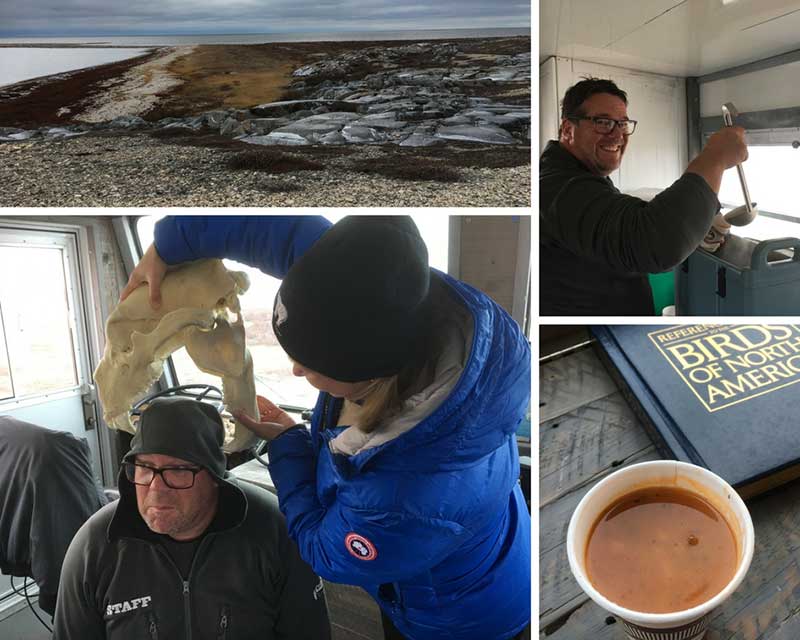
The polar bear traffic is busiest near the Frontiers North Tundra Buggy Lodge at Polar Bear Point.
The mobile lodge is a series of connected carriages with bunk-style units for guests and staff, a lounge car, dining car and outdoor viewing platforms.
Most of the time, the polar bears are asleep on the ice. Of course, the buggy buzzes with excitement every time a polar bear decides to stretch its legs.
One particular polar bear takes a shine to our vehicle and walks around our buggy several times.
Perhaps it’s looking for lunch?
One of the polar bears tries to chew a hole in the Tundra Buggy Lodge sewerage tank.
A staff member bangs the side of the car with a broom handle.
The startled polar bear slinks away but not before doing a bit of damage to the tank.
My most memorable polar bear encounter is when a large polar bear strides up to the open-air platform of our buggy.
It thumps the buggy with its paws.
I can’t help wondering if the polar bear thinks we’re a can of sardines to be pried open with its sharp claws. It stands on its back legs and peers curiously into the buggy.
Everyone rushes out to the platform for a closer look.
The woman at the front of the group nearly drops her camera when she sees the size of the polar bear’s teeth.
After a thrilling day out on the tundra with the polar bears, the plight of the polar bear has become so much more meaningful to me.
I’m saddened by the realisation that we may one day live in a world where there are no polar bears left in the wild.
Back in Churchill, the Northern Lights dance across the sky.
I grab my camera and peer nervously into the shadows while walking to the edge of town.
The Aurora Borealis forms a glowing emerald trail behind the polar bear street sign.
I stare at the sky in awe, feeling blessed to have been touched by the wonder of nature and to have had the chance to look into the eye of a polar bear.
These majestic animals are truly the kings of the Arctic.
Frontiers North has a five-day Churchill Town and Tundra Adventurer package from CAD$2899 a person or you can travel to Churchill independently and book a day tour (CAD$469) on the tundra buggy.
Check the latest prices for hotels in Churchill here
Churchill Northern Studies Centre
The Churchill Northern Studies Centre is an independent, not-for-profit research and education facility.
It’s one of the world’s top research facilities for studying Arctic science and offers a series of ‘learning vacation’ programs, with all proceeds going to support scientific research in Churchill.
The accommodation at the centre is basic, but comfortable, with dormitory-style rooms, shared washrooms with private showers, and communal meals in the dining room.
There is also an indoor viewing room where you can get a 360° view of the surroundings and the night skies from the warmth of a glass ‘bubble’.
The CNSC also offers programs throughout the year on Inuit culture, bird-watching, beluga whales, astronomy and the aurora borealis or ‘northern lights’.
Churchill is one of the best places on Earth to view them.
In addition to offering educational programs for travellers, there is also the opportunity to volunteer at the centre for a few weeks, in return for board and meals.
Don’t expect it to be an easy ride.
They expect volunteers to work at least six hours a day; six days a week.
You’re more likely to spend most of your time helping out in the kitchen, washing dishes or stuffing envelopes.
While there are other ways to visit Churchill’s most famous residents, this is the ‘real deal’, working alongside scientists involved in valuable research – which might just one day save the coolest animal on the planet.
Churchill Wild
Churchill Wild offers safaris at Nanuk Polar Bear Lodge and walking safaris while staying at Seal River Heritage Lodge.
A fun polar bear cartoon that will put a smile on your face.
How to get to Churchill
Fly to Churchill via Winnipeg with Air Nolinor. It’s worth spending a few days seeing the polar bears at Assiniboine Zoo and exploring these things to do in Winnipeg.
When to go? You can spot polar bears in summer and winter. However, the best months to see lots of polar bears are October and November.
- 25 Things To Do In Banff
- 25 Things To Do In Toronto
- 50 Things To Do In Vancouver
- 20 Things To Do In Whistler in Winter
- 7 Things To Do In Gananoque
- 30 Things To Do In Niagara Falls
- 20 Things To Do In Niagara On The Lake
- 30 Things To Do In Ottawa
- 25 Things To Do In Calgary
- 25 Things To Do In Winnipeg
- 20 Things To Do In Montreal
- Canada in Winter
- Canada in Summer
- Canada in Spring
- Canada in Fall
- 35 Things To Do In British Columbia
- 8 Things To Do In Penticton
- 10 Things To Do In Kelowna
- 11 Things To Do On Vancouver Island
- 22 Things To Do In Quebec In Winter
- 25 Things To Do In Yukon
- 20 Things To Do In Whitehorse
- 17 Things To Do In Yellowknife
- 20 Things To Do In Nova Scotia
- 5 Things To Do In Peggy’s Cove
- 11 Things To Do In Fredericton
- 20 Things To Do In Ottawa At Night
- Banff in Winter
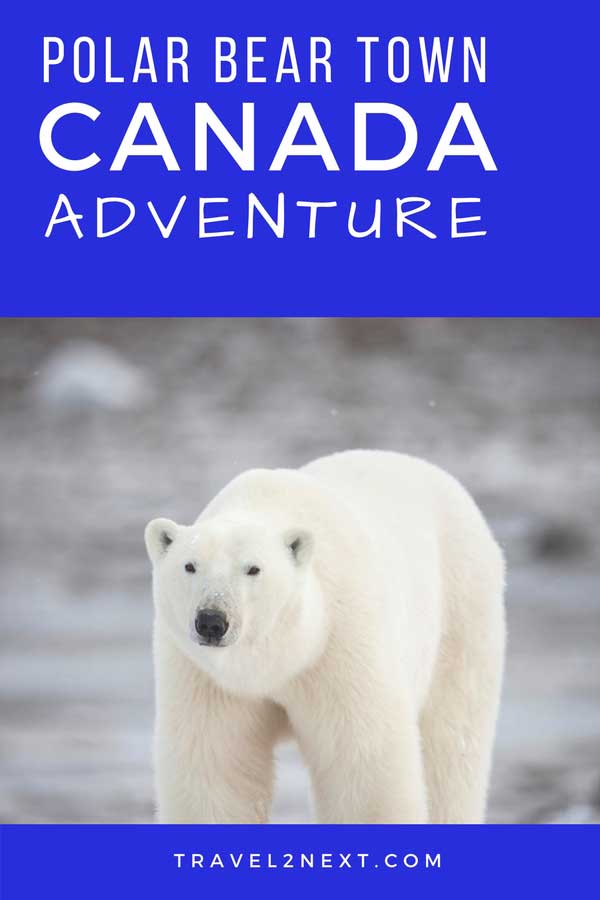
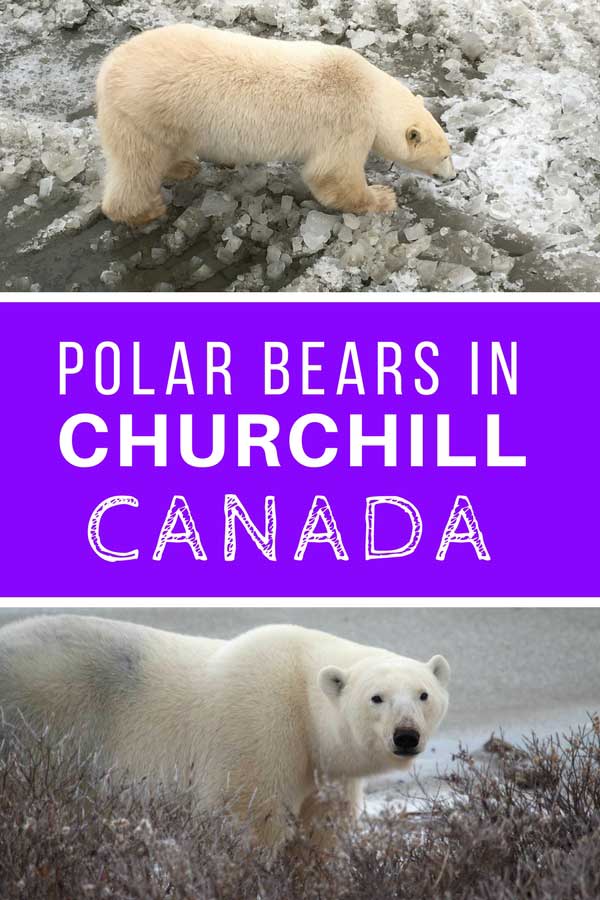
Plan Your Trip

Rent A Car – Find the best car rental rates at Discover Cars. They compare car hire companies to provide you with the best deal right now.

Find A Hotel – If you’re curious about this article and are looking for somewhere to stay, take a look at these amazing hotels.
